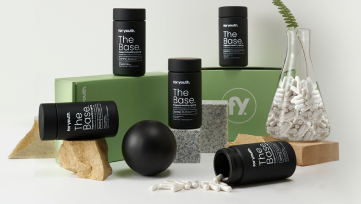Quercetin for Allergies: Does It Work?


 Shop our Quercetin
Shop our Quercetin 
Quercetin, a flavonoid prevalent in many fruits and vegetables, has been touted for its potential to mitigate allergy symptoms through its antioxidant and anti-inflammatory properties. This natural compound purportedly stabilizes mast cells, thereby inhibiting excessive histamine release—a common culprit in allergic reactions. Despite these beneficial claims, the extent and consistency of quercetin‘s effectiveness remain under scientific scrutiny. As we explore the nuances of how quercetin might integrate into allergy management strategies, it becomes essential to examine both the breadth of existing research and the real-world application of this supplement in allergic individuals. What are the implications of these findings for those seeking alternatives to traditional allergy medications?
Beyond its promising role in easing allergy symptoms, quercetin’s multifaceted benefits extend into various facets of health and wellness. Research highlights its potential in improving cardiovascular health, making it a subject of interest for those looking to support heart function naturally. Furthermore, its adaptability as a supplement benefits diverse groups, including seniors seeking to combat age-related inflammatory conditions, vegans and vegetarians looking for plant-based health boosts, and both men and women focusing on gender-specific health concerns. This versatility underscores quercetin’s significance in personalized nutrition and holistic health strategies.
What Is Quercetin?
Quercetin is a naturally occurring flavonoid found in many fruits, vegetables, and grains, known for its antioxidant and anti-inflammatory properties.
It has been extensively studied for its potential health benefits, including its ability to stabilize mast cells, which helps in reducing the release of histamine and other inflammatory substances.
This mechanism suggests a potential role in managing allergy symptoms and promoting overall immune health.
By signing up, you consent to receive For Youth emails
Get The Latest On Longevity Delivered To Your Inbox.
Quercetin Sources and Dosage
To incorporate quercetin into your diet, several natural sources are available, and supplements can also be used under guidance for specific dosages. Rich dietary sources include capers, onions, and apples.
For supplements, typical dosages range from 500 to 1000 mg per day, taken in divided doses. Consultation with a healthcare professional is recommended to determine the appropriate dosage for your individual health needs.
How Quercetin Affects Allergies
In the management of allergies, quercetin acts by stabilizing mast cells, thereby preventing the release of histamine and other inflammatory agents.
Key benefits include:
- Reduction in allergy symptoms severity
- Lower frequency of allergic reactions
- Minimized need for traditional antihistamines
- Enhanced immune response stability
These properties make quercetin a potential natural alternative for managing common allergic conditions.
Scientific Studies on Quercetin

 Shop our Quercetin
Shop our Quercetin 
Several studies have explored the impact of quercetin on allergic responses, demonstrating its potential benefits in allergy management.
Research indicates that quercetin can decrease the release of histamines, which are chemicals that trigger allergy symptoms.
Clinical trials have shown that patients experiencing seasonal allergies might find relief through quercetin supplements, further suggesting its efficacy as a natural antihistamine and anti-inflammatory agent.
Comparing Quercetin and Antihistamines
Understanding the differences between quercetin and traditional antihistamines helps illuminate alternative allergy treatment options.
Quercetin, a natural flavonoid, may stabilize mast cells, potentially reducing histamine release. Antihistamines, on the other hand, directly block histamine receptors, providing quicker symptom relief.
However, quercetin offers a holistic approach with fewer side effects, making it a viable long-term solution for managing allergies.
What You Need To Know About For Youth
For Youth demystifies the science of longevity, making it accessible to everyone. With the view of considering aging as a “disease” that can be cured, we aim to help individuals slow down or even reverse aging at a cellular level, ultimately leading to a healthier and longer life.
Aging is the underlying cause of various health issues, ranging from minor problems like wrinkles to severe diseases like Alzheimer’s or cancer. By slowing down the aging process, one can significantly improve their overall health and well-being.
For Youth offers a biological age test and a range of science-backed, lab-tested, and carefully sourced supplements, such as NMN or resveratrol, to help you monitor and counteract the effects of aging.
Quercetin by For Youth
⇒ The Zombie – Quercetin Singapore

 Shop our Quercetin
Shop our Quercetin 
Description:
Quercetin is a scientifically-backed, plant-based anti-aging supplement. The Quercetin Phytosome™ acts as both an antioxidant and senolytic, effectively targeting and eliminating senescent or “zombie” cells to promote a longer, healthier life. By removing these harmful cells, quercetin helps to reduce inflammation, alleviate allergy symptoms, strengthen the immune system, improve athletic performance, and address a variety of age-related issues.

 Shop our Quercetin
Shop our Quercetin 
While some companies may ambiguously mention “made in XXX”, they may not provide full disclosure about the chain of production. Unlike these companies, For Youth is committed to complete transparency and shares the details of our supply chain at every step of the process.
Sourced from Italy
Indena, the firm behind Quercetin Phytosome™, is a company with over a century’s worth of history based in Italy, specializing in herbal ingredients. They innovated the Phytosome™ technology to markedly escalate the bioavailability of ingredients typically not effectively absorbed by our bodies.
Produced in Italy
The flowering extract of the Sophora japonica or Japanese pagoda tree is refined into Quercetin Phytosome™ in Italy. The state-of-the-art Phytosome™ technology develops a free-flow matrix preventing quercetin from clumping and heightening its absorption rate dramatically. This innovation leads to an extraordinary 20-fold improvement in absorption relative to standard quercetin.
Encapsulated in France
Our Quercetin product is encapsulated within vegetarian capsules at our affiliate facilities located in France.
Bottled in Singapore
The Quercetin capsules are transported in large quantities to our Singapore location. Upon arrival, a third-party laboratory tests the capsules, which are then bottled by our partner at their pharmaceutical facilities in Singapore.








